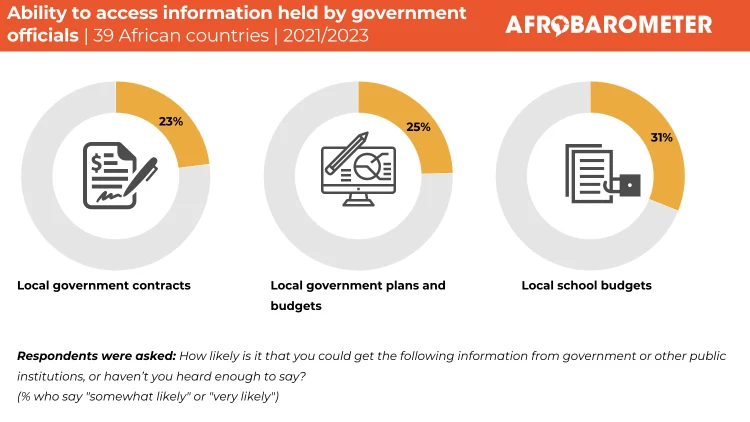The latest Afrobarometer report has revealed a significant demand among Africans for the right to public information, yet there is a perception that access to this information remains restricted across the continent. This finding is part of a broader analysis that underscores the ongoing challenges in the realm of access to information in Africa.
The Afrobarometer survey revealed a significant shift in African public opinion regarding the right to access information held by public officials and agencies. Despite the perception that information is exclusively for government use, a majority of Africans across 39 countries reject this proposition, indicating a strong desire for greater transparency and access to public information to actively participate in their countries’ governance and decision-making processes.
“Afrobarometer’s national partners conduct face-to-face interviews in the language of the respondent’s choice with samples of 1,200-2,400 adults that yield country-level results with margins of error of +/-3 to +/-2 percentage points at a 95% confidence level.”
Afrobarometer Report 2024
Specifically, the report stated that about eight in 10 respondents believe that information about local government budgets (81%) and local government bids and contracts (78%) should be accessible to the public. A slimmer majority (55%) also favours public access to information about the salaries of local government officials and teachers.
The Afrobarometer further disclosed that more than seven in 10 respondents consider it unlikely that they could obtain information about local government bids and contracts (72%), local government budgets (71%), and 65% hold the same view regarding local school budgets.
“The analysis shows that in countries where access to information about local government plans and budgets is seen as limited, citizens are more likely to see their elected officials as corrupt, and less likely to trust them”.
Afrobarometer Report 2024
The Afrobarometer report identified that perception of restricted access to information is strongly associated with perceptions of corruption and trust. Citizens who consider it unlikely that they could access local government and school information are more likely to perceive widespread corruption among government officials at all levels, including the Presidency. Trust in local government officials and members of Parliament are much lower in countries where citizens feel they cannot access information about their local governments and schools.
The report highlighted the challenges and nuances of information access across different African countries, reflecting the varied contexts of governance, policy, and social dynamics that influence the state of public information.
The Way Forward
To address the challenges of restricted access to public information in Africa, the Afrobarometer report calls for urgent action. It emphasized the need for governments civil society, and development partners to prioritize the right to public information as a means to promote transparency, accountability, and citizen engagement to enhance the availability and accessibility of public information. This includes simplifying and standardizing the format of public information, investing in digital technologies, and establishing user-friendly platforms for information dissemination.
Furthermore, the report underscored the importance of educating citizens about their rights to access public information. Governments should raise awareness about existing laws and regulations, empowering citizens to assert their rights and demand transparency from public institutions.
The Afrobarometer report highlighted the strong demand for public information among Africans, indicating a desire for transparency and accountability in governance. It underscored the critical role of transparency and access to information in fostering democratic processes and societal development.
However, the findings also revealed the significant challenges Africans face in accessing this information. The findings serve as a reminder of the ongoing need for concerted efforts to address the barriers to information access and to uphold the right to public information across the continent. By addressing these obstacles and adopting measures to promote transparency and citizen engagement, governments can bridge the gap between demand and restricted access, fostering an environment of informed decision-making and participatory democracy in Africa.
READ ALSO: Africa To Adopt AI and Big Data to Shape Political Campaigns, IPE 2024 Reports



















